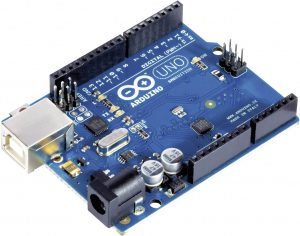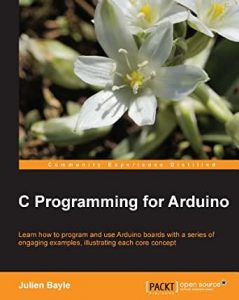You are an artist, an audiovisual installation designer, a student, a teacher, a researcher or a programmer and you want to create interaction systems, small smart circuits to make your computer sensing the world
You can learn Arduino following your own rhythm with full weeks or sporadic time slots, online or face-to-face in France, with Julien Bayle who also wrote a book about Arduino : C programming for Arduino
Working for a french company? You could have this training funded (contact us for more informations about this)

DESCRIPTION
Arduino is one of the most insteresting electronic open-source environment for artists & designers.
By using a simple Arduino circuit, some wires & electrical relays, some distance or flexion sensors, we can easily control a whole sound & visual installation, for instance.
Arduino can be programmed use C++ programming language through a so well documented and opensource/free Integrated Development Environment by using a simple USB Cable.
Arduino is the core of a very impressive number of generative and interactive installations and control/feedback systems by allowing to create tangible interfaces with software like Ableton Live, Max 8 and more.
Trained by Julien Bayle, artist programmer and author of C++ Arduino Programming book (2014), you’ll know about how to connect Arduino to your computer for controlling more or less complex generative processes and you’ll be amazed by the easy path to create your own physical interfaces.
Moreoften, our students trigger our ON-DEMAND mode and learn Arduino and Max 8 at the same time in specific dedicated sessions.
AUDIENCES & SKILLS
Artists, Interactive Art Installations, Interaction Designer, Researcher, Students, Physical Computing lovers
Our Arduino trainings are flexible and can address beginners, intermediate and advanced users.
During our first contact, we evaluate your skills through questions and we propose you a specific and dedicated training program.
TERMS & HOW TO
Our Arduino trainings can be done as One-To-One and Group modes.
You can choose Remote or Face-to-Face Training.
We can propose you the best flexibility by providing all possible combinations: you can start remotely, and come here to end your training, or, we could design a full week for your group, Face-to-Face here in France and get for each one of you some individual one-to-one 3 hours remotely after that…
DURATION
All courses durations can be modulated, but we used to propose you these 3 packages :
- TOTAL (5 days)
- ACCELERATED (3 days)
- REMOTE CAPSULES (3 hours slots)
During our first discussion, we decide together which mode fits your needs.
TOTAL mode gives you the solid/full/total autonomy with Arduino.
ACCELERATED MODE provides you everything you need to use Arduino without too much time constraint.
REMOTE CAPSULES is the most flexible mode which provides the best way to learn all along weeks and month, slower.
Depending on your needs, we can provide longer Arduino training sessions.
FUNDINGS
If you are working for a company in France, for a french institution, you can probably get your Arduino training funded.
Contact us for this to get more specific informations.
TRAINING GOALS
- Learn about electronic basics
- Learn microcontrollers dedicated C++
- Design a whole arduino project
- Give our computer a way to sense the world
- Use sensors to control our softwares
- Interactive installations design
- Human/Machine interfaces design
BOOK WRITTEN BY OUR TEACHER
Introduction to microcontrollers & Arduino
– Arduino’s family series presentation
– Principles & step of any arduino projects
– Installing Arduino IDE easily
– Electricity & circuits basics
– Introducing Fritzing and other design tools
– First contact with C/C++ language
– Libraries concept
– Variables & types
– Conditionnal structures (if, ternary operators and more)
– Loop structures (for/while & more)
– Comparisons
– Functions & scope concept
– Approaching optimization ways, lookup tables and other tips
– Introduction to tangible design
– Digital inputs
– Analog inputs & sampling
– Serial communications
– Outputs, PWM and feedback from the circuits
– Making the physical world moving (motors and more)
– Transistors & Relays
– Motors
– Sounding with DACs
– Understanding MIDI & OSC protocols
– Creating a small controllable synthesizer
– PCM librairies for playing audio files
– I2C & SPI ways of communicating
– Talking with MaX 8 & Processing with Arduino
– Interacting with Ableton Live through Max for Live
– Network & remote communications
– Code optimization
– Studying your own project feasibility


